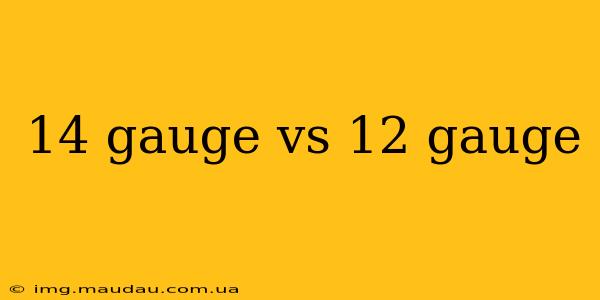Choosing the right shotgun gauge is crucial, impacting everything from recoil management to the effectiveness of your shots. This guide delves into the key differences between 14 gauge and 12 gauge shotguns, helping you make an informed decision based on your shooting needs and experience level.
Understanding Shotgun Gauges: A Quick Primer
Before diving into the specifics of 14 gauge vs. 12 gauge, let's clarify what "gauge" represents. The gauge of a shotgun refers to the number of lead balls, each with a diameter equal to the inside diameter of the barrel, that would weigh one pound. Therefore, a lower gauge number indicates a larger diameter barrel and a larger shell.
14 Gauge: The Lighter Alternative
The 14 gauge shotgun has gained popularity recently as a lighter alternative to the 12 gauge. Its smaller bore size results in less recoil, making it more manageable for younger shooters, those with smaller builds, or individuals sensitive to recoil. This reduced recoil translates to quicker target acquisition and follow-up shots, particularly beneficial in fast-paced shooting situations like sporting clays or upland bird hunting.
Advantages of 14 Gauge:
- Reduced Recoil: Significantly less recoil compared to the 12 gauge, leading to increased comfort and faster target acquisition.
- Lighter Weight: Generally lighter than comparable 12 gauge shotguns, contributing to reduced fatigue during extended shooting sessions.
- Improved Handling: The lighter weight and reduced recoil improve maneuverability and handling, making it easier to swing and aim.
Disadvantages of 14 Gauge:
- Limited Shell Availability: 14 gauge ammunition is less readily available than 12 gauge, potentially leading to higher costs and challenges in finding specific loads.
- Less Powerful: The smaller bore size means less shot payload compared to the 12 gauge, resulting in a slightly reduced effective range and stopping power. This is less of a concern for hunting smaller game birds.
- Higher Cost Per Round: Though this can vary by manufacturer and retailer, 14-gauge shells often command a slightly higher price per round than 12-gauge shells due to lower production volume.
12 Gauge: The Industry Standard
The 12 gauge remains the industry standard for shotguns, offering a balance of power, versatility, and widespread availability. Its larger bore allows for a greater shot payload, delivering more stopping power and a longer effective range. This makes it an excellent choice for hunting larger game, self-defense, and various shooting disciplines.
Advantages of 12 Gauge:
- Widely Available Ammunition: A vast selection of ammunition is available, offering various shot sizes, payloads, and types (e.g., slugs, buckshot, birdshot) to suit diverse shooting needs.
- Greater Stopping Power: The larger bore and heavier shot payload provide superior stopping power compared to the 14 gauge, making it ideal for self-defense and hunting larger game.
- Longer Effective Range: The heavier shot payload translates to a longer effective range, particularly important for hunting and long-range shooting.
Disadvantages of 12 Gauge:
- Significant Recoil: The substantial recoil can be challenging for beginners, smaller shooters, or those sensitive to recoil. This can lead to fatigue and difficulty with follow-up shots.
- Heavier Weight: 12 gauge shotguns are generally heavier than 14 gauge shotguns, which can lead to fatigue during extended use.
Choosing Between 14 Gauge and 12 Gauge: The Verdict
The best gauge for you depends entirely on your individual needs and preferences.
-
Choose 14 gauge if: You prioritize reduced recoil and lighter weight, primarily shoot smaller game birds, or are a beginner or smaller-statured shooter. The reduced recoil will improve your shooting experience and help you develop proper technique.
-
Choose 12 gauge if: You require greater stopping power, longer effective range, and access to a wider range of ammunition. Hunting larger game or needing a self-defense shotgun points towards the 12 gauge.
Ultimately, consider handling both gauges if possible to determine which feels more comfortable and manageable for you. This hands-on experience will be invaluable in making the right choice.
